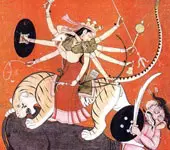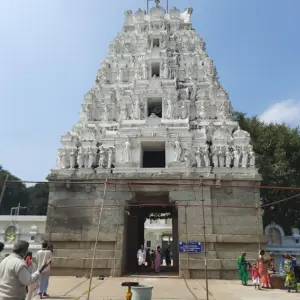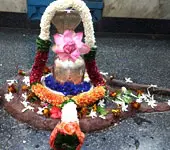Recommended for you
Devi goes on killing the commanders of Mahishasura
 Click here to know more..
Click here to know more..
Keelapatla Temple

In Telugu, Koneru means a tank. Since the idol of Venkateshwra Swamy at Keelapatla Temple was recovered from the bottom of a tank, Swamy is called Kon....
Click here to know more..Veerabhadra Bhujangam

gunaadoshabhadram sadaa veerabhadram mudaa bhadrakaalyaa samaashlisht'amugram.....
Click here to know more..
English Topics
Devi Mahatmyam
Click on any topic to open
- 49 Devi's Presence in Kindness, Contentment, and Nurturing
- 48 Durga as Lakshmi. Vritti, and Smriti
- 47 Why Devi is called Shanti
- 46 Why Is Devi Called Kshanti?
- 45 Meaning of Trishna In Durga Saptashati
- 44 Why Is Devi Called Hunger?
- 43 Difference Between Chetana And Buddhi
- 42 Why Devi Is Called Durga?
- 41 What Are The Eight Siddhis?
- 40 Namo Devyai Mahadevyai - Why Is She Called Devi And Mahadevi?
Please wait while the audio list loads..
30
Ganapathy
Shiva
Hanuman
Devi
Vishnu Sahasranama
Mahabharatam
Practical Wisdom
Yoga Vasishta
Vedas
Rituals
Rare Topics
Devi Mahatmyam
Glory of Venkatesha
Shani Mahatmya
Story of Sri Yantra
Rudram Explained
Atharva Sheersha
Sri Suktam
Kathopanishad
Ramayana
Mystique
Mantra Shastra
Bharat Matha
Bhagavatam
Astrology
Temples
Spiritual books
Purana Stories
Festivals
Sages and Saints
26
15
13
Copyright © 2024 | Vedadhara | All Rights Reserved. | Designed & Developed by Claps and Whistles
